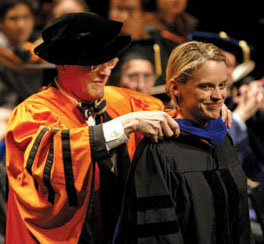First, during mass we sang a hymn I didn't much care for--"How Wonderful the Three-in-One" (in honor of Trinity Sunday):
How wonderful the Three-in-One,
Whose energies of dancing light
Are undivided, pure and good,
Communing love in shared delight.
Before the flow of dawn and dark,
Creation's Lover dreamed of earth,
And with a caring deep and wise,
All things conceived and brought to birth.
The Lover's own Belov'd, in time,
Between a cradle and a cross,
At home in flesh, gave love and life
To heal our brokenness and loss.
Their Equal Friend all life sustains
With greening power and loving care,
And calls us, born again by grace,
In Love's communing life to share.
How wonderful the living God:
Divine Belov'd Empow'ring Friend,
Eternal lover, Three-in-One,
Our hope's beginning, way and end.
I'm not sure what bothers me about this song, exactly--of course, "energies of dancing light" bothered me, and when I got to "greening power," I shut the hymnal. What is greening power? (What are energies of dancing light, for that matter?) Also, what is an "Equal Friend"? The Holy Spirit? Equal to whom? (Presumably to God and Christ.)
I guess the hymn seemed rather abstract and vague to me. It also seemed pretty emotive and a little cute ("between a cradle and a cross"). At least the homily was good--the service Stearns went to focused on the oil spill.
 Second, I finally made it to the exhibit, "The Sacred Made Real: Spanish Painting and Sculpture, 1600-1700" at the National Gallery with Hopkins (tomorrow is the last day of the exhibit). This little exhibit (it was contained in three rooms) was ... (I would say "very nice," except most of it was about the crucifixion and ecstatic experiences of saints, so "very nice" seems a little inappropriate); well, it was, at least, the opposite of vague.
Second, I finally made it to the exhibit, "The Sacred Made Real: Spanish Painting and Sculpture, 1600-1700" at the National Gallery with Hopkins (tomorrow is the last day of the exhibit). This little exhibit (it was contained in three rooms) was ... (I would say "very nice," except most of it was about the crucifixion and ecstatic experiences of saints, so "very nice" seems a little inappropriate); well, it was, at least, the opposite of vague.
The focus of the exhibit was the move toward realism at that time, which was evident in particular in the drops of blood and bruises and scrapes on the statues and paintings of Christ. What stood out to me, however, was the contemplation of Christ and his sufferings--there were paintings and sculptures of Mary holding Christ, of St. Francis and St. John of the Cross in ecstasy (St. John is holding a book with a little mountain on top of it--The Ascent of Mount Carmel), of Mary Magdalen adoring a cru
 cifix. These representations of saints adoring Christ invited the viewer to join in that adoration. In one painting, Luke gazed up at the cross, palette and paintbrush in hand. In another, St. Bernard of Clairvaux leans his head on Christ's shoulder, smiling, with his eyes closed.
cifix. These representations of saints adoring Christ invited the viewer to join in that adoration. In one painting, Luke gazed up at the cross, palette and paintbrush in hand. In another, St. Bernard of Clairvaux leans his head on Christ's shoulder, smiling, with his eyes closed.



.jpg)








